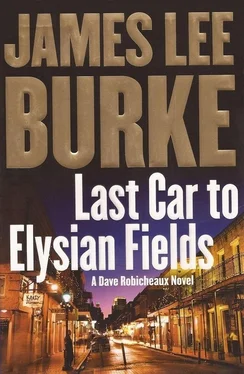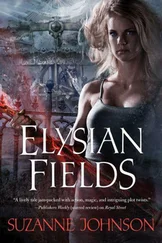“Junior’s granddaughter owns a twelve-string guitar she thinks might have belonged to Leadbelly. Maybe you could take a look at it. Unless you just really don’t have the time?” he said.
I followed Father Jimmie in my pickup truck into St. James Parish, which lies on a ninety-mile corridor between Baton Rouge and New Orleans that environmentalists have named Toxic Alley. We drove down a state road south of the Mississippi levee through miles of sugarcane and on through a community of narrow, elongated shacks that had been built in the late nineteenth century. At the crossroads, or what in south Louisiana is called a four-corners, was a ramshackle nightclub, an abandoned company store with a high, tin-roofed gallery, a drive-by daiquiri stand, and a solitary oil storage tank that was streaked with corrosion at the seams, next to which someone had planted a tomato garden.
Most of the people who lived at the four-corners were black. The rain ditches and the weeds along the roadside were layered with bottles of beer and pop cans and trash from fast-food restaurants. The people who sat on the galleries of the shacks were either old or infirm or children. I watched a car filled with teenagers run a stop sign and fling a quart beer bottle on the side of the road, ten feet from where an elderly woman was picking up litter from her lawn and placing it in a vinyl bag.
Then we were out in the countryside again and the sky was as blue as a robin’s egg, the sugarcane bending in the wind as far as the eye could see, egrets perched like white sculptures on the backs of cattle in a roadside pasture. But inside the loveliness of the day was another element, discordant and invasive, the metallic reek of natural gas, perhaps from a wellhead or a leaking connection at a pump station. Then the wind shifted and it was gone and the sky was speckled with birds rising from a pecan orchard and from the south I could smell the brassy odor of a storm that was building over the Gulf.
I looked at my watch. No more than one hour with Father Jimmie friends, I told myself. I wanted to get back to New Iberia and forget about the previous night and the trouble with Gunner Ardoin.
Maybe it was time to let Father Jimmie take care of his own problems, I thought. Some people loved adversity, got high on it daily, and secretly despised those who would take it from them. That trait didn’t necessarily go away because of a Roman collar.
The state road made a bend and suddenly the endless rows of sugarcane ended. The fields were uncultivated now, empty of livestock, dotted with what looked like settling ponds. The Crudup family lived down a dirt lane in a white frame house with a wraparound veranda hung with baskets of flowers. Three hundred yards behind the house was a woods bordered with trees that were gray with dead leaves and the scales of air vines, as though the treeline had been matted with premature winterkill.
Father Jimmie had set the hook when he had mentioned Lead-belly’s name, but I knew as we drove down the road toward the neat white house back dropped by a poisoned woods that this trip was not about the recidivist convict who wrote “Goodnight Irene” and “The Midnight Special” and who today is almost forgotten.
In fact, I wondered if I, like Father Jimmie, could not wait to fill my day with adversity in the way I had once filled it with Jim Beam and a glass of Jax with strings of foam running down the sides.
When I cut my engine in front of the house, I took a Dr. Pepper from the cooler on the seat and raked the ice off the can and drank it empty before stepping out onto the yard.
Junior Crudup’s granddaughter had a face like a goldfish, light skin that was dusted with freckles, and glasses that turned her eyes into watery brown orbs. She sat in a stuffed chair, fanning herself with a magazine, her rings of fat bulging against her dress, waiting for me to finish examining the Stella guitar that had lain propped in a corner of her attic for thirty years. The strings were gone, the tuning keys stiff with rust, the sound hole coated with cobweb. I turned the guitar on its belly and looked at three words that were scratched into the back of the neck: Huddie Love Sarie.
“Leadbelly’s real name was Huddie Ledbetter. His wife was named Sarie,” I said.
Junior Crudup’s granddaughter looked through a side window at two children playing on a rope swing that was suspended from a pecan tree.
Her name was Doris. She kept straightening her shoulders, as though a great weight were pressing on her lungs. “How much it wort’?” she asked.
“I couldn’t say,” I replied.
“Four or five songs were in the bottom of the guitar case, each with Junior’s signature,” Father Jimmie said.
“Yeah, what they wort’?” Doris Crudup asked.
“You’d have to ask somebody else,” I said.
She gave Father Jimmie a look, then got up from her chair and took my coffee cup into the kitchen, although I had not finished drinking the coffee in it.
“Her husband died three years ago. Last month the social worker cut off her welfare,” Father Jimmie said.
“Why?”
“The social worker felt like it. That’s the way it works. Take a walk with me,” he said.
“I need to get back home.”
“You have time for this,” he said.
We went outside, into the sunlit, rain-washed loveliness of the fall afternoon. The pecan tree in the side yard puffed with wind and a yellow dog rolled on its back in the dirt while the children swung back and forth above it on their rope swing. But as I followed Father Jimmie down an incline toward the woods in back I could feel the topography changing under my feet, as though I were walking on a sponge.
“What’s that smell?” I said.
“You tell me.” He tore a handful of grass from the soil and held the roots up to my nose. “They truck it in from all over the South. Doris’s lungs are as much good to her as rotted cork. People around here carry buckets in their cars because of their children’s constant diarrhea.”
I held onto the trunk of a withered persimmon tree and looked at the soles of my shoes. They were slick with a black-green substance, as though I had walked across a factory floor. We crossed a board plank spanning a rain ditch. The water was covered with an iridescent sheen that seemed to be rising in chains of bubbles from the bottom of the ditch. Perhaps twenty settling ponds, layered over with loose dirt, were strung along the edge of the woods, each of them crusted with a dried viscous material that looked like an orange scab.
“Is this Doris’s property?” I said.
“It belonged to her grandfather. But twenty years ago Doris’s cousin made his “X’ on a bill of sale that had Junior’s name typed on it. The cousin and the waste management company that bought the land both claim he’s the Junior Crudup of record and Doris is out of luck.”
“I’m not following you.”
“No one knows what happened to the real Junior Crudup. He went into Angola and never came out. There’s no documentation on his death or of his release. Figure that one out.”
“I don’t want to.”
Father Jimmie studied my face. “These people here don’t have many friends,” he said.
I slipped the flats of my hands in my back pockets and scuffed at the ground with one shoe, like a third-base coach who had run out of signals.
“Think I’ll pass,” I said.
“Suit yourself.”
Father Jimmie picked up a small stone and side-armed it into the woods.
I heard it clatter among the tree trunks. Birds should have risen from the canopy into the sky, but there was no movement inside the tree limbs.
“Who owns this waste management company?” I asked.
“A guy named Merchie Flannigan.”
Читать дальше












